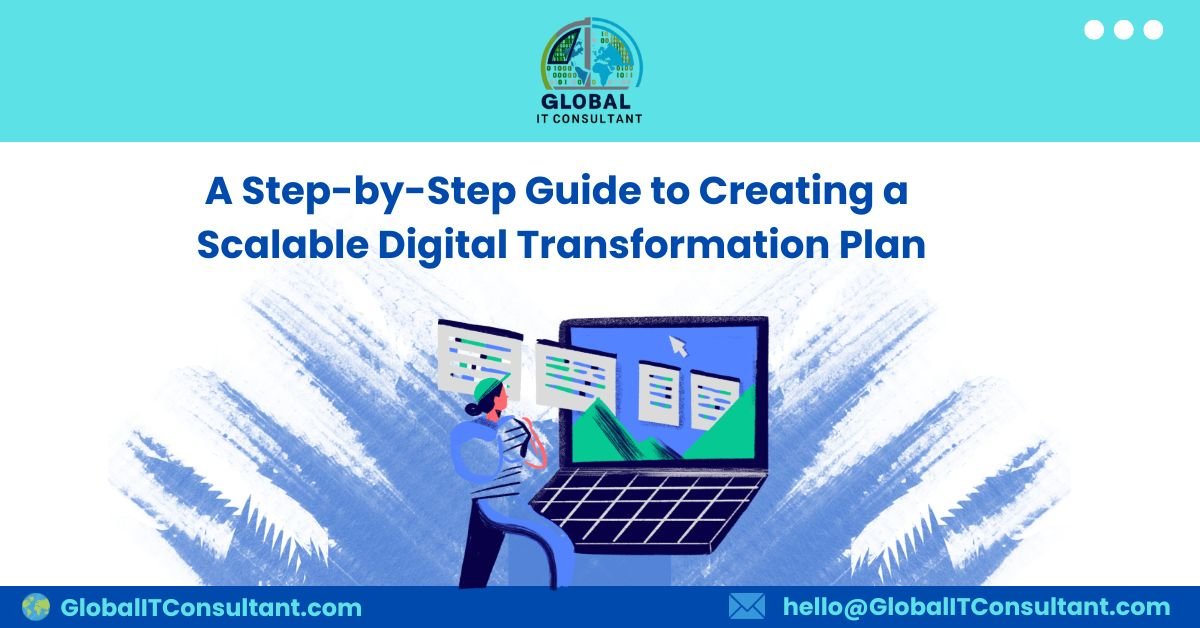In today’s fast-evolving business landscape, digital transformation is no longer optional—it’s a strategic necessity. Whether you’re a startup in Silicon Valley or a growing enterprise in Florida, a well-planned digital roadmap can unlock innovation, increase agility, and drive sustainable growth.
But the key to success lies in one word: scalability.
In this blog, we’ll walk you through a step-by-step guide to building a scalable digital transformation plan that works for U.S.-based businesses of all sizes and industries.
🧭 Step 1: Define Clear Business Objectives
Every transformation should begin with the “why.” Identify the core goals your business wants to achieve. These could include:
- Improving customer experience
- Reducing operational costs
- Scaling into new markets
- Enhancing data-driven decision-making
🎯 Tip: Align your digital goals with your long-term business strategy, not just short-term tech trends.
📊 Step 2: Assess Your Current Digital Maturity
Conduct a digital audit of your organization to understand where you stand. Evaluate:
- Current technologies in use
- Workforce digital skills
- Process automation levels
- Data infrastructure and cybersecurity
This gap analysis helps determine the areas that need the most attention.
🛠️ Step 3: Build the Right Technology Stack
A scalable digital strategy requires the right tech foundation. Consider:
- Cloud computing (AWS, Azure, GCP) for scalability
- Automation tools like Power Automate or UiPath
- CRM/ERP systems for integrated operations
- AI and analytics platforms for insights and optimization
👨💻 Tip: Choose platforms that allow API integrations and can grow with your business.
👥 Step 4: Engage Key Stakeholders
Digital transformation affects every level of your organization. Involve:
- C-suite leaders for vision and budget
- Department heads for functional alignment
- IT teams for implementation
- Employees for adoption and feedback
A cross-functional team ensures smoother adoption and better outcomes.
🔄 Step 5: Redesign Processes, Not Just Tools
Technology alone isn’t transformation. Review and re-engineer key workflows to remove bottlenecks, eliminate redundancies, and automate where possible.
📌 Focus on:
- Customer service journeys
- Internal approvals and workflows
- Inventory and supply chain operations
🚀 Step 6: Start Small, Then Scale
Don’t try to digitize everything at once. Start with a pilot project—for example, automating invoice processing or implementing a customer portal.
Once the pilot succeeds, scale the approach across other departments or regions.
📈 Step 7: Set KPIs and Measure Progress
Define success metrics such as:
- Time saved on manual tasks
- Customer satisfaction improvement
- Cost reduction
- Revenue growth from digital channels
Use real-time dashboards and analytics tools to track, review, and adapt.
🔐 Step 8: Prioritize Security and Compliance
A scalable digital plan must include robust cybersecurity practices—especially in regulated U.S. industries like healthcare, finance, and legal.
Ensure your strategy aligns with:
- HIPAA
- GDPR
- CCPA
- Industry-specific compliance frameworks
👨🏫 Step 9: Train Your Workforce
Upskill your employees with training on:
- New tools and platforms
- Cyber hygiene and data handling
- Agile thinking and digital culture
Digital transformation is not just technical—it’s cultural.
🔄 Step 10: Iterate and Evolve
Digital transformation is a continuous journey. Set up regular review checkpoints, gather feedback, and adapt your plan based on:
- Market changes
- Customer feedback
- Emerging technologies
This keeps your strategy agile and future-proof.
✅ Final Thoughts
Creating a scalable digital transformation plan isn’t about adopting every new tech trend—it’s about building a flexible, future-ready business.
At Global IT Consultant, we help U.S. businesses design and implement digital strategies that scale with confidence and deliver measurable ROI.
👉 Need help building your transformation roadmap?
Contact our digital strategy experts today for a free consultation.

